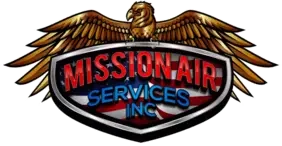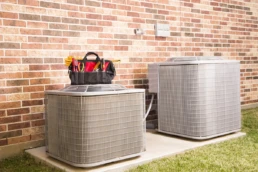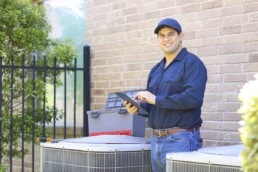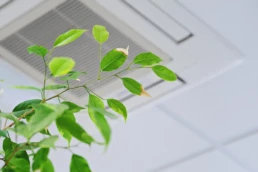Fall Maintenance Tips for Commercial HVAC Systems in Plant City, FL
Maintaining a comfortable indoor environment is critical to the success of any commercial business in Plant City, FL. With the hot and humid Florida climate, your HVAC system works hard year-round, ensuring optimal temperatures and air quality for employees and customers alike. However, like any mechanical system, your commercial HVAC unit requires regular maintenance to perform at its best.
Even though Plant City doesn't experience the drastic temperature shifts found in other parts of the country, HVAC maintenance is still essential to prevent breakdowns, improve energy efficiency, and extend the lifespan of your equipment. In this post, we'll dive into some key fall maintenance tips for commercial HVAC systems and explain why these tasks are crucial for businesses operating in this area.
1. Inspect Air Filters and Ductwork
Air quality is a priority for any commercial building, whether it's an office space, a retail store, or an industrial facility. One of the simplest but most effective HVAC maintenance tasks is checking and replacing air filters.
Why Air Filter Maintenance Matters
Dirty or clogged filters make your HVAC system work harder to circulate air, resulting in increased energy consumption and higher utility bills. Additionally, poor air filtration can lead to reduced indoor air quality, which may affect the health and productivity of your employees. The Environmental Protection Agency (EPA) estimates that poor indoor air quality can cost businesses up to $168 billion annually in lost productivity.
Ductwork Inspection
Along with filters, ductwork should be inspected for leaks, blockages, or debris buildup. According to the U.S. Department of Energy, about 20-30% of the air moving through the duct system is lost due to leaks or improper insulation. Fixing these issues not only improves efficiency but also ensures that your HVAC system delivers consistent, clean air to all areas of the building.
2. Check Thermostat Calibration and Settings
Thermostats play a crucial role in maintaining a comfortable indoor environment and regulating energy usage. Fall is the perfect time to inspect and calibrate your thermostats to ensure accurate readings and settings.
Why Calibration is Important
A thermostat that is even slightly off in its readings can lead to overcooling or overheating, causing unnecessary strain on your HVAC system. According to Energy Star, businesses can save up to 10% on heating and cooling costs by properly setting and maintaining thermostats. Calibration ensures that your system only operates when needed, which saves energy and reduces wear and tear on the equipment.
Programmable and Smart Thermostats
Consider upgrading to programmable or smart thermostats if you haven’t already. These devices allow you to set specific temperature schedules, so your system isn’t running when the building is unoccupied, such as during weekends or off-hours. Smart thermostats can even learn your building’s temperature preferences and make automatic adjustments for maximum efficiency.
3. Inspect and Clean Coils
Both evaporator and condenser coils are critical to the cooling and heating processes in HVAC systems. Over time, these coils can become dirty or corroded, reducing the efficiency of the system.
Cleaning Coils for Better Efficiency
Dirty coils can reduce your HVAC system’s efficiency by up to 30%, according to the U.S. Department of Energy. When debris and dirt build up on the coils, it acts as insulation, preventing the coils from effectively transferring heat. This forces the system to work harder and consume more energy to achieve the desired temperature. Regular cleaning of coils in the fall ensures that your system will be ready to handle the demands of both mild and extreme weather.
4. Lubricate Moving Parts
Your HVAC system has multiple components that rely on proper lubrication to function smoothly. Fall maintenance should include a thorough inspection of all moving parts, including fan belts, motors, and bearings.
Prevent Mechanical Wear
Lubrication prevents friction and wear, which can lead to mechanical failure if left unchecked. Lack of lubrication is a common cause of motor failure in HVAC systems, and replacing a motor can be costly. By lubricating these parts, you not only extend the lifespan of your HVAC equipment but also reduce the risk of unexpected breakdowns. Routine maintenance like this is estimated to reduce the chance of system failure by up to 95%, according to industry experts.
5. Test and Tighten Electrical Connections
Electrical issues are a leading cause of HVAC malfunctions. Regularly testing and tightening electrical connections during fall maintenance helps prevent potential hazards and ensures the system operates safely.
Why This Step Is Crucial
Loose or faulty electrical connections can cause intermittent power failures, short circuits, or even fires. Additionally, improper connections can force the HVAC system to draw more power than necessary, resulting in higher energy bills and premature system wear. Technicians should thoroughly inspect all electrical components, including wiring, fuses, and circuit breakers, to ensure everything is functioning correctly.
6. Inspect Belts and Pulleys for Wear
Belts and pulleys are small yet vital components of your HVAC system. If they become worn or damaged, they can lead to system inefficiencies or even failures.
Avoid Unplanned Downtime
A worn belt can slip or snap, causing the entire HVAC system to stop working, which could lead to expensive repairs and downtime. Regularly inspecting and replacing worn belts ensures that your system operates smoothly and avoids unexpected breakdowns during peak hours of operation. Preventative maintenance is much cheaper than emergency repairs.
7. Clear Outdoor Units of Debris
In Plant City, where vegetation can be lush year-round, outdoor HVAC units can easily become obstructed by leaves, branches, or other debris. This debris restricts airflow and reduces the efficiency of the condenser.
Why Outdoor Unit Maintenance Matters
Restricted airflow can cause the system to overheat and malfunction, potentially leading to compressor failure, one of the most expensive HVAC repairs. Keeping the area around the unit clear by at least two feet will ensure proper airflow and extend the life of the equipment.
8. Conduct a Comprehensive System Test
Once individual components have been inspected, cleaned, and repaired, it’s essential to conduct a comprehensive system test to ensure everything is working as it should.
System Testing for Peace of Mind
This test should include checking refrigerant levels, system pressures, and overall performance. By ensuring your HVAC system is operating within manufacturer-recommended parameters, you can prevent unexpected failures and ensure your system is prepared for the months ahead.
9. Schedule Regular Professional Inspections
While your in-house maintenance team can handle some tasks, others require the expertise of a professional HVAC technician. Scheduling a professional inspection in the fall allows for a more thorough review of your system and ensures all aspects are functioning properly.
Why Professional Inspections Are Important
Trained technicians have the tools and knowledge to spot potential issues before they turn into costly repairs. According to a study by the Building Efficiency Initiative, regularly serviced commercial HVAC systems can achieve up to 40% in energy savings compared to neglected systems. A professional inspection will also ensure that your HVAC system complies with any local or state regulations.
For Commercial HVAC Services in Plant City, FL, Contact Mission Air Services Today
Regular fall maintenance of your commercial HVAC system is essential to keep it running efficiently and reliably, particularly in a city like Plant City, FL, where the climate can be demanding year-round. By performing routine tasks like checking filters, cleaning coils, and inspecting electrical components, you can reduce energy costs, prevent costly breakdowns, and extend the life of your system.
At Mission Air Services, we specialize in providing high-quality commercial HVAC maintenance and repair services. Our team of experienced technicians can handle all your HVAC needs, ensuring your system operates at peak performance throughout the year. Whether you need a seasonal inspection or emergency repairs, you can trust us to deliver expert service with professionalism and care.
Don't wait for a problem to occur—schedule your fall HVAC maintenance today. Contact Mission Air Services in Plant City, FL, and let us help keep your commercial HVAC system running smoothly for years to come.
Understanding Air Quality: The Role of HVAC Systems in Allergies and Asthma Management in Plant City, FL
As the sun shines bright over Plant City, FL, and the air fills with the sweet scent of blooming strawberries, it's easy to overlook what might be lurking inside our homes. Did you know that indoor air quality can be worse than outdoor air quality? For those who suffer from allergies or asthma, the air we breathe inside our homes can significantly impact our health. This blog will explore how HVAC systems play a crucial role in managing indoor air quality, particularly for residents dealing with respiratory issues.
The Importance of Indoor Air Quality
Indoor air quality (IAQ) refers to the condition of the air within a building, specifically regarding the health and comfort of its occupants. Poor IAQ can lead to various health issues, particularly for those with allergies and asthma. In fact, according to the Environmental Protection Agency (EPA), indoor air can be two to five times more polluted than outdoor air, and sometimes even higher!
Common Indoor Air Pollutants
Understanding what contributes to poor IAQ is essential. Here are some common indoor air pollutants that can aggravate allergies and asthma:
- Dust Mites: These tiny creatures thrive in warm, humid environments and are often found in bedding, upholstery, and carpets.
- Mold Spores: Mold can grow in damp areas of the home, releasing spores into the air that can trigger allergic reactions.
- Pet Dander: Skin flakes, saliva, and urine from pets can be significant allergens.
- Pollen: While typically an outdoor allergen, pollen can easily enter homes through open doors and windows.
- Volatile Organic Compounds (VOCs): These are emitted by many household products like paints, cleaning supplies, and furniture.
The good news is that many of these pollutants can be managed through proper HVAC maintenance and upgrades.
How HVAC Systems Impact Indoor Air Quality
HVAC systems are not only crucial for maintaining comfortable temperatures in your home; they also play a significant role in enhancing indoor air quality by filtering out pollutants and ensuring proper ventilation.
Filtering Out Pollutants
HVAC systems play a vital role in maintaining good indoor air quality. The primary function of your HVAC system is to regulate temperature, but it also filters the air. Here’s how:
- Air Filters: Most HVAC systems come equipped with air filters that capture dust, pollen, and other particles. It’s essential to check and replace these filters regularly—at least every 1-3 months. A clean filter can trap airborne particles, reducing allergens and irritants in your home.
- MERV Ratings: When choosing filters, look for those with a higher Minimum Efficiency Reporting Value (MERV) rating. A MERV rating of 8-12 is usually sufficient for residential homes and can capture a significant amount of allergens.
- HEPA Filters: For those with severe allergies or asthma, High-Efficiency Particulate Air (HEPA) filters are an excellent option. These filters can trap 99.97% of particles that are 0.3 microns or larger, making them highly effective against allergens.
Ventilation: Fresh Air is Key
Proper ventilation is essential in ensuring that indoor air remains fresh and free from contaminants. Here’s why ventilation matters:
- Dilution of Pollutants: Adequate ventilation helps dilute indoor pollutants by bringing in fresh outdoor air.
- Humidity Control: High humidity levels can lead to mold growth. HVAC systems equipped with humidity control features can help maintain optimal humidity levels (between 30-50%).
- Exhaust Systems: Exhaust fans in kitchens and bathrooms can remove moisture and odors, further improving air quality.
The Role of Humidifiers and Dehumidifiers
In Plant City, where humidity levels can soar, having the right balance of moisture in your home is crucial for good air quality.
- Humidifiers: In dry months, adding moisture can help ease respiratory issues. A humidifier can also prevent dryness in your skin and nasal passages.
- Dehumidifiers: Conversely, during humid months, dehumidifiers can help maintain comfort by removing excess moisture, preventing mold growth and dust mite proliferation.
The Impact of Regular HVAC Maintenance
Regular HVAC maintenance is essential to ensure that your system operates efficiently and effectively. Here are some key reasons why regular maintenance should be a priority:
Enhances System Efficiency
A well-maintained HVAC system operates more efficiently, which can lead to lower energy bills. According to the U.S. Department of Energy, regular maintenance can improve system efficiency by 5-15%.
Prolongs Equipment Lifespan
Regular check-ups and servicing can extend the life of your HVAC system. On average, an HVAC system lasts about 15-20 years, but neglect can shorten this lifespan significantly.
Reduces the Risk of Breakdowns
Regular maintenance can help identify and resolve minor issues before they become major problems. This is particularly important in Florida's climate, where extreme temperatures can place a strain on HVAC systems.
Improves Indoor Air Quality
By keeping the system clean and well-maintained, you can reduce the levels of airborne pollutants and allergens in your home, providing a healthier environment for you and your family.
Understanding the Role of Air Quality Monitors
Investing in an air quality monitor can provide real-time data on the air quality in your home. Here’s how these devices can be beneficial:
- Tracking Pollutants: Air quality monitors can detect levels of pollutants such as VOCs, particulate matter, and humidity. This data can help you identify sources of poor air quality.
- Prompting Action: If the monitor detects elevated levels of pollutants, you can take immediate steps to address the issue, whether that’s changing your HVAC filters or increasing ventilation.
- Health Awareness: Understanding your home’s air quality can empower you to take control of your environment, particularly if you or your family members suffer from allergies or asthma.
Practical Tips for Improving Indoor Air Quality
While HVAC systems play a significant role in maintaining air quality, there are additional steps you can take to enhance your home’s environment:
Regular Cleaning
- Dust and vacuum frequently, using a vacuum with a HEPA filter to minimize the spread of allergens.
- Wash bedding and curtains in hot water regularly to reduce dust mites and allergens.
Control Humidity Levels
- Use exhaust fans in bathrooms and kitchens to reduce moisture.
- Consider using a dehumidifier in damp areas, such as basements, to prevent mold growth.
Limit Indoor Pollutants
- Choose low-VOC paints and cleaning products.
- Avoid smoking indoors and limit the use of candles and incense.
Regular HVAC Maintenance
- Schedule annual HVAC inspections with a professional to ensure your system is in good working condition.
- Don’t hesitate to reach out for help if you notice unusual sounds or odors from your HVAC system.
For HVAC Services in Plant City, FL, Contact Mission Air Services Today
Maintaining good indoor air quality is essential for the health and well-being of everyone in your home, particularly for those suffering from allergies and asthma. Your HVAC system plays a vital role in this process, and understanding its capabilities can empower you to create a healthier living environment.
At Mission Air Services, we are committed to helping you achieve the best indoor air quality possible. Our team of professionals is here to provide expert HVAC maintenance, installations, and upgrades tailored to your specific needs. Don’t wait until allergy season strikes—contact us today to schedule an appointment and ensure that the air you breathe at home is clean and healthy!
Why Won’t My AC Turn On
There’s nothing quite like the moment you walk into your home on a hot Lakeland afternoon, expecting a wave of cool, refreshing air to greet you—only to be met with stifling heat. You immediately check the thermostat, press a few buttons, and wait. But nothing happens. Your air conditioner won’t turn on, and the dread sets in. What could be wrong?
Living in Plant City, FL, where the temperature can rise quickly, having a functional air conditioner isn’t just a luxury—it’s essential. Whether you’re a long-time resident or a newcomer to the Sunshine State, understanding why your AC won’t turn on is crucial. In this blog, we’ll explore the common reasons behind this issue, provide educational insights, and offer practical tips to get your AC up and running again.
Common Reasons Your AC Won’t Turn On
When your AC fails to start, there are several potential culprits. Some of these issues are simple fixes you can handle on your own, while others require professional assistance. Below, we break down the most common reasons for an AC that won’t turn on.
Power Issues
Sometimes, the solution is as simple as checking the power supply. If your AC isn’t turning on, start by verifying that it’s receiving power.
- Tripped Circuit Breaker: Florida’s frequent thunderstorms can cause power surges, leading to a tripped circuit breaker. Head to your electrical panel and check if the breaker for your AC has tripped. If it has, reset it by flipping the switch. However, if the breaker trips repeatedly, this could indicate a more serious electrical issue that requires professional attention.
- Blown Fuse: Your AC system may have a fuse located in the disconnect box near the outdoor unit. A blown fuse can prevent your AC from turning on. If you’re comfortable checking the fuse, you can replace it yourself. However, if you’re unsure, it’s best to call a professional.
- Loose Wiring: Over time, vibrations can cause wiring connections to loosen, disrupting power to your AC unit. Unless you’re experienced with electrical work, it’s advisable to contact an HVAC technician to inspect and tighten any loose connections.
Thermostat Issues
Your thermostat serves as the control center for your AC system. If it’s not working correctly, your AC won’t turn on, regardless of how well the rest of the system is functioning.
- Incorrect Settings: Ensure that your thermostat is set to “cool” mode and that the temperature is set lower than the current room temperature. Sometimes, a simple mistake in settings can be the reason your AC won’t start.
- Dead Batteries: If your thermostat is battery-operated, check the batteries. Dead or low batteries can cause your thermostat to malfunction, leading to an unresponsive AC unit.
- Faulty Thermostat: Thermostats, like any electronic device, can fail over time. If your thermostat is old or showing signs of malfunction, it might need to be replaced.
Clogged Air Filter
Your air filter plays a critical role in your AC system by trapping dust, debris, and allergens. However, if the filter becomes too clogged, it can obstruct airflow and cause the system to overheat, leading to a shutdown.
- Restricted Airflow: A clogged filter reduces airflow, making your AC work harder to cool your home. This increased strain can lead to overheating, which triggers the system to shut down as a safety measure.
- Frozen Evaporator Coils: In some cases, a dirty filter can cause the evaporator coils to freeze. When the coils are frozen, your AC won’t be able to function properly, and the system may shut down completely.
To avoid these issues, it’s essential to change your air filter regularly. In Florida’s hot and humid climate, it’s recommended to check and replace the filter every 1-3 months.
Refrigerant Leak
Refrigerant is the lifeblood of your AC system, responsible for cooling the air that circulates throughout your home. If there’s a refrigerant leak, your AC won’t be able to cool effectively, and it may not turn on at all.
- Low Refrigerant Levels: When refrigerant levels are low due to a leak, the pressure in your AC system drops, causing it to malfunction. Low refrigerant can also lead to frozen coils, further exacerbating the issue.
- Hissing or Bubbling Sounds: If you hear hissing or bubbling noises near your AC unit, it could indicate a refrigerant leak. This is a serious problem that requires immediate attention from a licensed HVAC technician.
Refrigerant leaks not only affect your AC’s performance but can also be harmful to the environment. If you suspect a refrigerant leak, contact a professional to diagnose and repair the issue.
Faulty Capacitor
The capacitor is a small, yet vital, component that helps start the motor in your AC system. Without a functioning capacitor, your AC won’t turn on.
- Burned-Out Capacitor: Capacitors can wear out over time, especially in areas with high temperatures like Lakeland, FL. If the capacitor burns out, the motor won’t receive the necessary electrical charge to start, resulting in a non-functional AC unit.
- Clicking Sound: If you hear a clicking sound when your AC tries to start, it could be a sign that the capacitor is failing. Replacing a capacitor is a task best left to professionals, as it involves working with electrical components.
Dirty Condenser Coils
The outdoor unit of your AC system contains the condenser coils, which release the heat removed from your home. Over time, these coils can become dirty and covered with debris, reducing their efficiency.
- Overheating: When the condenser coils are dirty, the unit has to work harder to expel heat, leading to overheating. If the system overheats, it may shut down to prevent damage.
- Reduced Efficiency: Dirty coils can also lead to reduced cooling efficiency, causing the system to struggle to maintain the desired temperature. This added strain can eventually prevent the system from turning on.
Regular maintenance, including cleaning the condenser coils, can prevent these issues and keep your AC running smoothly.
Drain Line Issues
Your AC system produces condensation as it cools the air. This moisture is drained through a pipe called the condensate drain line. If this line becomes clogged, it can cause water to back up into the system, leading to a shutdown.
- Clogged Drain Line: In Florida’s humid climate, algae and mold can quickly build up in the drain line, causing a blockage. When the drain line is clogged, the system’s safety switch may activate to prevent water damage, shutting down the AC.
- Water Leaks: If you notice water pooling around your indoor unit, it could be a sign of a clogged drain line. This issue needs to be addressed promptly to prevent further damage.
Clearing a clogged drain line can be done using a wet/dry vacuum, but if the clog is severe, it’s best to call a professional.
Compressor Failure
The compressor is the heart of your AC system, responsible for circulating refrigerant between the indoor and outdoor units. If the compressor fails, your AC won’t turn on.
- Overheating: Compressors can overheat due to various factors, including dirty coils, low refrigerant levels, or electrical issues. Overheating can cause the compressor to shut down or fail completely.
- Aging System: If your AC is older, the compressor may simply be nearing the end of its lifespan. In this case, replacing the compressor or even the entire system may be necessary.
Compressor failure is one of the more serious AC issues and often requires professional diagnosis and repair.
Preventive Measures to Avoid AC Problems
Preventing AC issues before they start is always better than dealing with a malfunction. Here are some preventive measures you can take to keep your AC running smoothly:
- Regular Maintenance: Schedule annual maintenance with a professional HVAC technician. Regular inspections can catch potential issues before they become major problems.
- Change Filters: Replace your air filters regularly to ensure proper airflow and prevent the system from overheating.
- Keep the Area Clean: Ensure that the area around your outdoor unit is free from debris, plants, and other obstructions. This helps maintain proper airflow and prevents overheating.
- Monitor Thermostat Settings: Check your thermostat settings regularly to ensure they are correct. This simple step can prevent unnecessary strain on your system.
- Address Issues Early: If you notice any unusual sounds, odors, or performance issues, address them immediately. Ignoring small problems can lead to more significant and costly repairs down the line.
For AC Services in Plant City, FL, Contact Mission Air Services Today
If your AC won’t turn on, don’t wait until the Florida heat becomes unbearable. At Mission Air Services, we understand how vital a functioning air conditioner is for your comfort and well-being. Our team of experienced HVAC technicians is ready to diagnose and repair any issues with your AC, ensuring your home stays cool and comfortable.
We pride ourselves on delivering prompt, professional, and reliable service. Whether it’s a simple fix or a more complex problem, you can trust Mission Air Services to get the job done right. Don’t let a malfunctioning AC disrupt your day—contact us today for expert AC services in Plant City, FL.
Understanding SEER Ratings and Their Impact on Your Florida Home
When it comes to choosing an energy-efficient HVAC system for your home, understanding SEER ratings is crucial. SEER (Seasonal Energy Efficiency Ratio) is a measure of an air conditioner or heat pump's cooling efficiency. In this blog post, we will explain what SEER ratings are and how they can impact your home. By understanding SEER ratings, you can make an informed decision when selecting an HVAC system that balances energy efficiency and comfort.
What is SEER Rating?
SEER rating is a standardized measurement that represents the cooling efficiency of an air conditioner or heat pump. It is calculated by dividing the cooling output during a typical cooling season by the energy consumed in watt-hours. The higher the SEER rating, the more energy-efficient the system is.
How is SEER Rating Determined?
SEER ratings are determined through laboratory testing under controlled conditions. The test measures the cooling output and energy consumption of the system over a range of temperatures and operating conditions. The average cooling output and energy consumption are then used to calculate the SEER rating.
Impact on Energy Efficiency:
The SEER rating directly impacts the energy efficiency of your HVAC system. A higher SEER rating means that the system can provide the same cooling output while consuming less energy. This translates to lower energy bills and reduced environmental impact. Upgrading to a higher SEER-rated system can result in significant long-term energy savings.
Cost Considerations:
While higher SEER-rated systems offer better energy efficiency, they often come with a higher upfront cost. However, it's important to consider the long-term savings in energy bills when evaluating the cost-effectiveness of a higher SEER-rated system. Additionally, some utility companies offer rebates or incentives for installing high-efficiency HVAC systems, which can help offset the initial investment.
Comfort Level:
SEER ratings not only impact energy efficiency but also the comfort level in your home. Higher SEER-rated systems often have advanced features, such as variable-speed compressors and multi-stage cooling, which provide more precise temperature control and better humidity management. This can result in a more comfortable indoor environment, with consistent cooling and reduced humidity levels.
Climate Considerations:
The climate in which you live plays a role in determining the ideal SEER rating for your HVAC system. In warmer climates, where air conditioning is used extensively, a higher SEER-rated system may be more beneficial due to the increased energy savings. However, in milder climates, where cooling demands are lower, a lower SEER-rated system may be sufficient.
System Compatibility:
When considering a new HVAC system, it's important to ensure that the SEER rating is compatible with other components of your system. For example, if you have an older furnace or air handler, it may not be able to fully utilize the benefits of a high SEER-rated air conditioner or heat pump. Consulting with an HVAC professional can help you determine the best system compatibility for your home.
Understanding SEER ratings is essential when selecting an energy-efficient HVAC system for your home. Higher SEER-rated systems offer better energy efficiency, resulting in lower energy bills and reduced environmental impact. However, it's important to consider the upfront cost, climate considerations, and system compatibility when evaluating the ideal SEER rating for your home. Consulting with an HVAC professional can help you make an informed decision and ensure optimal comfort and energy efficiency in your home.
The Importance of Regular HVAC Maintenance in Florida
Living in the sunshine state of Florida comes with its fair share of challenges, especially when it comes to maintaining a comfortable indoor environment. With the scorching heat and high humidity levels, having a properly functioning HVAC system is essential. In this blog post, we will discuss the importance of regular HVAC maintenance for Florida homeowners. By understanding the benefits of maintenance, you can ensure optimal performance, energy efficiency, and a comfortable living space all year round.
Improved Energy Efficiency:
Florida's hot and humid climate means that HVAC systems often have to work harder to maintain a comfortable temperature indoors. Over time, dust, debris, and other contaminants can accumulate in the system, hindering its efficiency. Regular maintenance, including cleaning the air filters, coils, and ducts, helps remove these obstructions, allowing the system to operate at its full potential. As a result, you can enjoy lower energy bills and reduce your carbon footprint.
Extended Lifespan of the HVAC System:
Investing in an HVAC system is a significant financial commitment. To protect this investment, regular maintenance is crucial. By scheduling routine inspections and tune-ups, HVAC technicians can identify and address any potential issues before they escalate into major problems. This proactive approach helps extend the lifespan of your HVAC system, saving you from costly repairs or premature replacements.
Enhanced Indoor Air Quality:
Florida's warm and humid climate creates an ideal environment for mold, mildew, and other allergens to thrive. These contaminants can find their way into your HVAC system, circulating throughout your home and compromising indoor air quality. Regular maintenance, such as cleaning or replacing air filters, helps remove these pollutants, ensuring cleaner and healthier air for you and your family. This is especially important for individuals with allergies or respiratory conditions.
Consistent Comfort:
Imagine the frustration of your HVAC system breaking down on a sweltering Florida day. Regular maintenance helps prevent unexpected breakdowns and ensures that your system operates smoothly when you need it the most. Technicians will check for any signs of wear and tear, lubricate moving parts, and perform necessary repairs or adjustments. By keeping your HVAC system in top shape, you can enjoy consistent comfort throughout the year.
Compliance with Warranty Requirements:
Most HVAC systems come with manufacturer warranties that require regular maintenance to remain valid. Neglecting maintenance can void these warranties, leaving you responsible for any future repairs or replacements. By scheduling regular maintenance with a qualified HVAC professional, you not only protect your investment but also stay compliant with warranty requirements.
Regular HVAC maintenance is essential for Florida homeowners to ensure optimal performance, energy efficiency, and a comfortable living environment. By investing in routine inspections, cleaning, and tune-ups, you can extend the lifespan of your HVAC system, improve indoor air quality, and avoid costly repairs. Don't wait for your system to break down in the heat of summer; take proactive steps to maintain your HVAC system and enjoy a cool and comfortable home year-round.
The Importance of Choosing the Right HVAC Contractor for Your Home Project
When it comes to HVAC (Heating, Ventilation, and Air Conditioning) projects for your home, choosing the right contractor is crucial. The quality of installation, maintenance, and repairs can significantly impact the performance and lifespan of your HVAC system. In this blog post, we will discuss the importance of selecting the right HVAC contractor for your home project. By understanding the benefits of working with a reputable and qualified professional, you can ensure a successful and stress-free HVAC experience.
Expertise and Experience:
HVAC systems are complex and require specialized knowledge for installation, maintenance, and repairs. A reputable HVAC contractor will have the necessary expertise and experience to handle your specific project. They will be familiar with different HVAC equipment, understand local building codes and regulations, and stay updated with industry advancements. By choosing a knowledgeable contractor, you can have peace of mind knowing that your HVAC system is in capable hands.
Proper Licensing and Insurance:
Working with a licensed and insured HVAC contractor is essential for protecting yourself and your home. A valid license ensures that the contractor has met the necessary requirements and has the skills to perform the job correctly. Insurance coverage protects you from liability in case of accidents or damages that may occur during the project. Always verify the contractor's license and insurance status before hiring them for your HVAC project.
Quality Installation:
Proper installation is crucial for the optimal performance and efficiency of your HVAC system. A skilled HVAC contractor will follow industry best practices and manufacturer guidelines to ensure a quality installation. They will accurately size the equipment, install ductwork correctly, and test the system for proper airflow and functionality. A poorly installed HVAC system can lead to inefficiency, frequent breakdowns, and costly repairs down the line.
Timely Maintenance and Repairs:
Regular maintenance is essential for keeping your HVAC system in top condition and preventing potential issues. A reliable HVAC contractor will offer maintenance plans and perform routine inspections, cleaning, and tune-ups. In case of repairs, they will promptly diagnose the problem and provide effective solutions. Timely maintenance and repairs help prolong the lifespan of your HVAC system, improve energy efficiency, and ensure a comfortable indoor environment.
Energy Efficiency and Cost Savings:
An experienced HVAC contractor can help you choose energy-efficient equipment that suits your home's specific needs. They will consider factors such as size, insulation, and climate to recommend the right HVAC system. Energy-efficient equipment can significantly reduce your energy consumption and lower utility bills. Additionally, a properly installed and maintained system will operate efficiently, saving you money in the long run.
Warranty Coverage and Customer Support:
Working with a reputable HVAC contractor ensures that you receive proper warranty coverage for your HVAC system. They will register the equipment with the manufacturer and provide documentation for warranty claims. Additionally, a reliable contractor will offer excellent customer support, addressing any concerns or questions you may have. They will stand behind their work and provide ongoing assistance throughout the lifespan of your HVAC system.
Choosing the right HVAC contractor is essential for the success of your home project. By selecting a reputable and qualified professional, you can ensure expert installation, timely maintenance, and efficient repairs. The right contractor will have the necessary expertise, proper licensing and insurance, and a commitment to customer satisfaction. Invest the time and effort to research and choose a reliable HVAC contractor, and enjoy the benefits of a well-functioning and efficient HVAC system in your home.
Improving Indoor Air Quality with HVAC Systems
Indoor Air Quality (IAQ) is a critical aspect of maintaining a healthy and comfortable living environment. Poor IAQ can lead to various health issues, including allergies, respiratory problems, and discomfort. HVAC (Heating, Ventilation, and Air Conditioning) systems play a crucial role in improving IAQ by effectively filtering and circulating the air in our homes. In this blog post, we will explore how HVAC systems can contribute to better IAQ and provide tips for optimizing indoor air quality through HVAC maintenance and upgrades.
Proper Ventilation:
One of the primary functions of an HVAC system is to provide ventilation, which helps remove stale air and introduce fresh outdoor air. Proper ventilation is crucial for diluting indoor pollutants and maintaining a healthy indoor environment. HVAC systems with mechanical ventilation options, such as energy recovery ventilators (ERVs) or heat recovery ventilators (HRVs), can efficiently exchange indoor and outdoor air while minimizing energy loss.
Air Filtration:
HVAC systems are equipped with air filters that capture dust, pollen, pet dander, and other airborne particles. Regularly replacing or cleaning these filters is essential for maintaining optimal IAQ. Upgrading to high-efficiency filters, such as HEPA (High-Efficiency Particulate Air) filters, can further improve air filtration by trapping smaller particles and allergens. Consult with an HVAC professional to determine the most suitable filter for your system.
Humidity Control:
Controlling humidity levels is crucial for maintaining good IAQ. Excessive humidity can promote mold and mildew growth, while low humidity can cause dryness and discomfort. HVAC systems with integrated humidifiers and dehumidifiers can help regulate indoor humidity levels. These devices work in conjunction with the HVAC system to add moisture or remove excess moisture from the air, creating a more comfortable and healthier indoor environment.
Regular Maintenance:
Proper HVAC maintenance is essential for ensuring optimal IAQ. Regularly scheduled maintenance, including cleaning coils, checking ductwork for leaks, and inspecting and cleaning the condensate drain, helps prevent the buildup of mold, bacteria, and other contaminants. Additionally, professional HVAC maintenance can identify and address any issues that may impact IAQ, such as leaks or malfunctioning components.
Duct Cleaning:
Over time, dust, debris, and allergens can accumulate in the ductwork of HVAC systems, reducing IAQ. Professional duct cleaning can help remove these contaminants, improving the overall air quality in your home. Consider scheduling duct cleaning every few years or as recommended by an HVAC professional.
Indoor Air Quality Monitoring:
Investing in an indoor air quality monitoring system can provide real-time data on the air quality in your home. These systems measure various parameters, such as particulate matter, volatile organic compounds (VOCs), and carbon dioxide levels. By monitoring IAQ, you can identify potential issues and take appropriate measures to improve air quality, such as adjusting ventilation or upgrading filtration systems.
For Indoor Air Quality Services in Plant City, FL Contact Mission Air Services
Maintaining good IAQ is crucial for our health and well-being. HVAC systems play a vital role in improving IAQ by providing ventilation, air filtration, and humidity control. By following proper HVAC maintenance practices, upgrading filters, and considering additional IAQ measures, such as humidity control and air quality monitoring, you can create a healthier and more comfortable indoor environment for you and your family. Consult with an HVAC professional to assess your specific IAQ needs and determine the best strategies for improving indoor air quality in your home.







